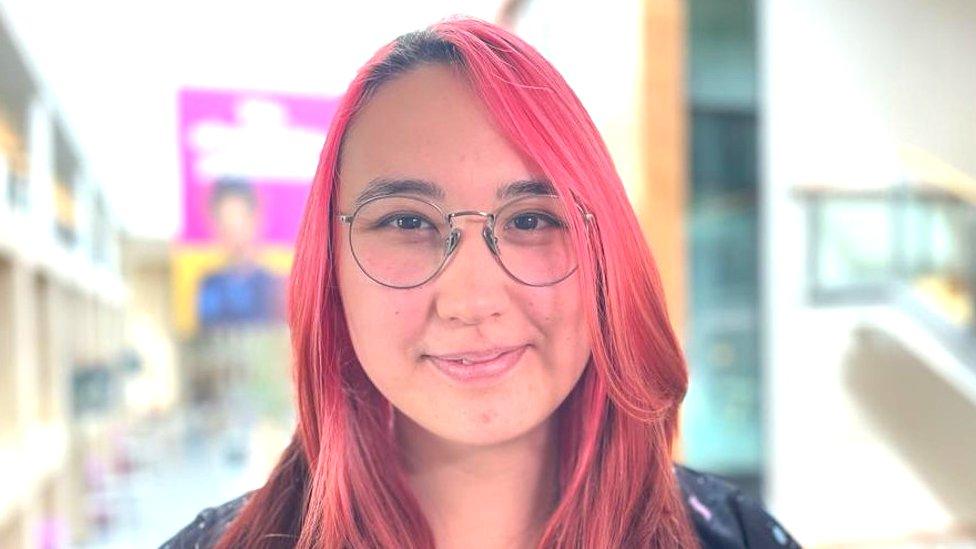I see the world differently - that's a plus
- Published

Sakura Brandi defines herself as having autism and ADHD
Scotland's finance sector says it needs 50,000 recruits in the next three years, so it is casting its net wide - to get beyond stereotypes and draw in people with unconventional skills
Among its targets for jobs are people with autism and other 'neuro-divergent' conditions, for whom modern bank offices are being designed.
Advice to employers is to talk about the condition, and don't judge on performance until different needs are addressed, including distractions from noise and light, and the way meetings are handled.
"I perceive the world differently, and interact with it differently," says Sakura Brandi.
"But that's not necessarily always a bad thing," she understates.
The 23-year old defines herself as having autism and ADHD. But of course, that's not the only way to define her.
She has many other identities: part-Japanese, part-Italian, schooled in Rome, a polyglot with two masters degrees in psychology, and now a graduate and resident of Edinburgh.
Working with autistic people before she joined NatWest as a graduate trainee, she only recently realised she shares their condition, and she's still getting used to what that means.
"It gives me lots of creativity and helps me problem-solve in an out-of-the-box way," she says. "There's definitely lots of pluses as well."
Those who campaign on autism and conditions that come under the banner of "neuro-divergent", also including dyslexia and dyspraxia, say they include at least one in 10 of us.
The charity Autism Understanding Scotland says it could be between 15% and 25%.
Not just about money
That proportion depends where you place the border between neuro-diversity, which includes all of us, and the neuro-divergent, which is those who depart some distance from the norm.
That means a large part of the workforce. And not only is that a challenge to managers who already employ such people (and may have such conditions themselves) but an opportunity for recruiters.
With a workforce of nearly 60,000, NatWest, which includes Royal Bank of Scotland, has more than 500 people in its neuro-divergent staff group, helping managers to understand their needs with tip sheets, and providing support for each other.
Barclays' new office in central Glasgow was designed with advice on the needs of neuro-divergent workers. Among the requirements are to cut down on bright lights, background noise and distractions, which can all become exaggerated.

Barclays' new Glasgow office was designed with the needs of neuro-divergent workers in mind
The need to shift attitudes on the issue is particularly true in a tight labour market, but more so when you consider the potential of such people, if they're well managed.
Scottish Financial Enterprise, the trade body, reckons that there will be more than 50,000 vacancies in the sector in the next three years. This week, it published a new skills strategy, which aims to help with widening access and career progression.
With a change of logo, it has dropped the maths symbols and wishes to challenge stereotypes.
Sandy Begbie, chief executive of SFE and the guiding force behind the Scottish government's youth work guarantee, says young people in particular are likely to see finance as a job for the middle class, better-educated, white and usually male.
Recruiters have worked hard to overcome that, he says, but there is still work to do.
And there are many different work roles to cover, including software, marketing and communications. It's not just about maths, or even about finance.

Zsosia Anna Utry is an employer adviser with Aberdeen-based Autism Understanding Scotland, and says autistic people can be afraid to disclose their identity with autism because it is so misunderstood, and those with it are often seen as problematic personalities rather than people in need of different types of support.
She advises an open conversation "without being judged as incapable of doing the job".
She recommends open conversations between line managers without being judged as incapable of doing the job.
A specialist assessment can identify the needs of the individual, which can differ widely.
"Usually, it can help if the environment is assessed, so that autistic employees feel comfortable and not overloaded with sensory stimulus, as well as clear information about tasks and duties. And confirming those in writing can be quite helpful."
It can make a big difference for those with autism to have a fidget toy to help them focus, or a weighted blanket on their knees to help keep them grounded.
An equaliser
While lockdown and working from home has made many people more anxious, the move to virtual meetings has helped for some.
Zoom and Teams meetings "have to be more ordered with people taking their turns," says Ms Utry.
"It is an equaliser, and if they're not comfortable, they can turn the camera off. If they're not comfortable speaking, they can put their thoughts in the (typed) chat."
For recruitment, Utry says "Interviews and panel discussions are difficult, so it's important for recruiters to keep in mind that the assessment reflects the actual job people are required to do.
"The most important thing: assess for the core skills and not for the cultural fit.
"It's important employers understand this is not about difficult personalities, or lack of motivation, when someone has a performance issue. It may be underlying cognitive differences that bring about misunderstanding."
Space to grow
Sukara, who says she fidgets with plastic beads, admits there are things she struggles with.
"Human interaction can be really exhausting, because a lot of the social norms that we all use are based on what neuro-typical people find the most comfortable and that can be more tiring for me.
"I sometimes struggle with just listening to people for a long time and my brain will switch off or starts to do other things. So I use things like my fidget toy to try and keep my brain engaged for as long as possible.
"Something visual during the meeting is really helpful because then I'm getting that information from two different sources. If they have notes beforehand, that they can help."
Sukara is very positive about her future at the bank. "It gives me a lot of variety which is something I really need. I have a lot of interests and I have a lot of things I love doing.
"So I'm quite comfortable where I am now, knowing that I have a lot of space to grow."
Related topics
- Published12 October 2021

